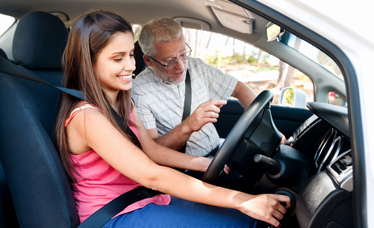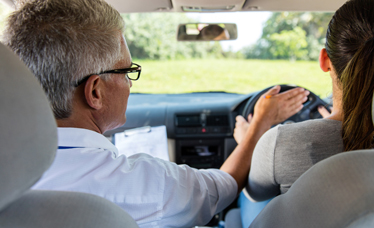Chapter 9 – Section 2
Signs of a DUI Driver
Alcohol often causes a person to drive abnormally on the road. Alcohol is a depressant that slows bodily functions. Reduced tension and lower inhibitions are common, causing the impaireddriver to take risks he or she normally would not. Decision-making is also greatly altered, as clear and concise thought is difficult. In addition to breaking basic traffic laws, the impaired driver often exhibits the following driving behaviors::
-
A. Speeding
-
Alcohol affects a person’s ability to decide right from wrong and to judge safety in general. Speed is often increased, and unsafe chances behind the wheel are often taken.
-
B. Driving Too Slowly
-
In a futile attempt to hide their intoxication, impaired drivers often drive substantially below the speed limit.
-
C. Weaving
-
The impaired driver loses focus on the road and may fall asleep or simply lose control of the vehicle. Coordination begins to deteriorate, with weaving the most obvious and common driving trait.
-
D. Lights
-
Alcohol adversely affects basic brain functions, such as memory. Turning on driving lights may be overlooked, resulting in a dangerous situation with a dark car on the road.
-
E. Open Windows
-
The impaired driver often believes cold air will keep him or her awake while driving. An open car window in cold weather late at night is often a sure sign that the driver is intoxicated.
-
F. Lane Straddling
-
Impaired drivers often use lane-dividing lines as guides to stay on the road. This is an obvious indication of an intoxicated driver, as focus is lost and every attempt is made to stay on the road.
-
G. Tailgating
-
Tailgating is a basic driving violation, but it is especially common with the impaired driver. Vision becomes impaired, depth is distorted, and the eyes react more slowly to lights.
-
H. Turning Difficulty
-
An impaired driver may signal to turn one way and then erratically turn the other way. It is very common for the impaired driver to make unusually wide or narrow turns. Motor skills are diminished.
Symptoms of intoxication that police officers are taught to look for include:
- Flushed face
- Bloodshot eyes (watery, red and/or glassy)
- Scent of alcohol on breath
- Slurred speech
- Difficulty getting license out of wallet
- Unable to comprehend the officer’s questions
- Wobbling or staggering when getting out of vehicle
- Swaying or instability when standing
- Using the vehicle for support
- Inappropriate attitude towards the police officer
- Soiled or disorderly clothing
- Stumbling when walking
- Disorientation as to time and place
- Unable to follow directions
Ways to Sober Up

As time passes, the body processes and eliminates alcohol.
There is no easy remedy for chronic or short-term abuse of alcohol. The only way to sober up is to allow the body time to absorb and dissipate alcohol in the system, a process called “oxidation.” Food and coffee are often perceived as viable ways to reduce alcohol in the system, but these are misconceptions. Water consumed while drinking dilutes alcohol in the body and may lessen the effects on the brain; however, this does not reduce the BAC. Water cannot reverse the effects of hours of drinking. Oxidation occurs in the liver, and nothing can be done to either slow down or speed up this process.
The Only Proven Solution: Time and Sleep – As a depressant, alcohol usually induces sleep. Sleep allows time for the body to absorb and dissipate the alcohol from the system. Time allows the body to absorb the alcohol. The body can oxidize only one ounce of alcohol per hour, meaning a BAC of .08% would require at least eight hours to be fully absorbed by the body..

Sleep allows time for your body to absorb and dissipate alcohol.
As of now, no one has discovered a quick way to remove alcohol from the body. Several problems occur when you consume too much alcohol. Alcohol concentrates in your inner ear and disturbs your sense of balance. Alcohol can trap needed nutrients and waste products in the liver, inflaming the liver cells. Alcohol interferes with a phase of deep sleep, causing you to have a poor night’s rest. Alcohol also causes dehydration. Traditional remedies do not work. Coffee may give you a caffeine boost, but it does not ease the symptoms. Fruit juice may rehydrate the body a bit, but it may also upset your stomach, as will aspirin.
Time is the only way to repair the damage.
DUI Prevention
-
Designated Driver Program
-
The designated driver program was developed to help deter drinking and driving while encouraging sober, designated drivers. One person in a group is discouraged from drinking alcoholic beverages and made responsible for the rest of the group. This person will drive the others home, ensuring that those who may be intoxicated and dangerous will not be on the roads.
Designated drivers often receive support from the establishments where they and their friends drink and eat, and sometimes they receive complimentary non-alcoholic drinks and food. Requirements to participate as a designated driver include:
- Must possess a valid driver’s license.
- Must be in a group of two or more people.
- Must identify self verbally.
- Must not consume any alcoholic beverage throughout the evening.
- Should be at least 21 years of age.
- Must understand that management reserves the right to refuse service to anyone at any time.
These programs have helped decrease DUI-related deaths. The drinker often cannot consciously help him or herself and needs a friend to step forward. Designated drivers save lives!















